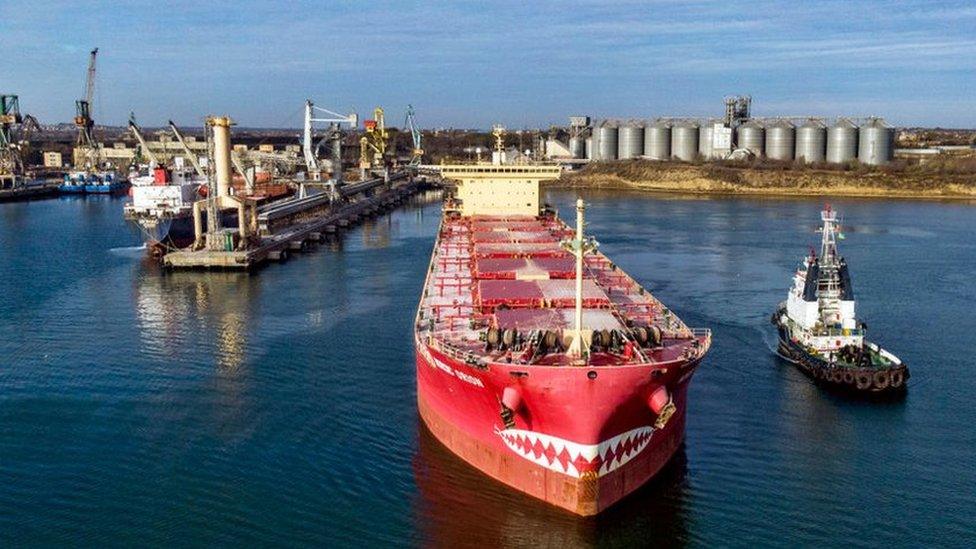Ukraine war: Drones target Odesa grain stores near Romania border
- Published
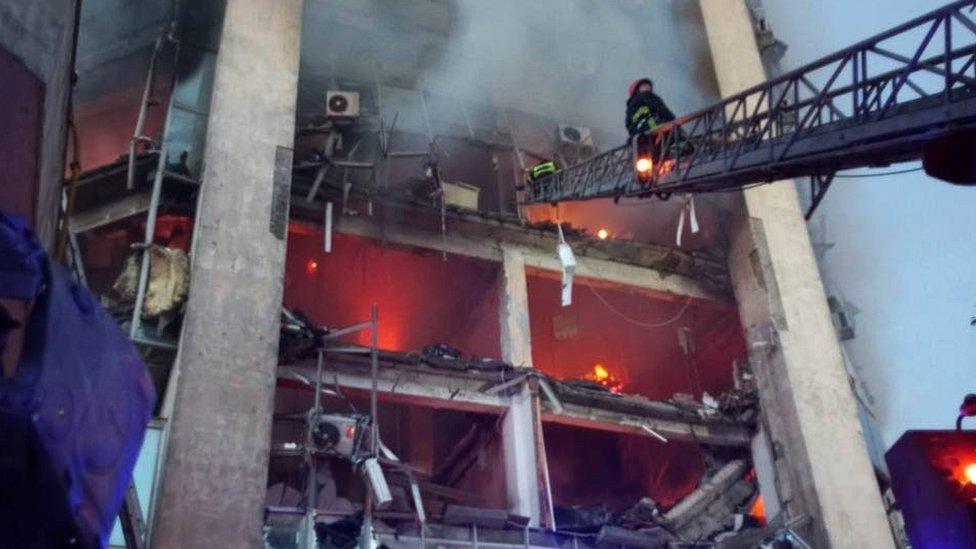
Images of the overnight drone attack were released but officials did not specify which port was hit
A Russian drone strike has hit Ukrainian port facilities at Izmail on the River Danube, a short distance from Nato member state Romania.
A grain warehouse and an elevator for loading grain were damaged.
Almost 40,000 tonnes of grain destined to African countries, China and Israel were damaged, Ukraine said.
Russia began targeting Ukraine's ports after abandoning a UN deal that enabled the safe grain export between both countries across the Black Sea.
"These are the very ports that have become the foundation of global food security today," Ukrainian minister Oleksandr Kubrakov said on his Twitter.
Video, filmed from the Romanian side of the Danube, external roughly 3km (1.9 miles) away, showed an extensive fire raging in the port area of Izmail early on Wednesday.
Romanian President Klaus Iohannis condemned Russia's continued attacks on Ukrainian infrastructure "in the proximity of Romania" as unacceptable.
Odesa regional leader Oleh Kiper said emergency services were working on the site of the latest Russian attack and there were no reports of any casualties.
President Volodymyr Zelensky said that "unfortunately there has been damage" - and the regional chief posted several images on social media indicating that several structures had been hit.
Ukraine's defence ministry said an elevator had been damaged. Officials said the Izmail district prosecutor had launched an investigation into a cargo terminal, a warehouse and an elevator that were all damaged, without detailing exactly where in the Odesa region.
Ukraine is one of the world's major exporters of wheat and corn.
According to data from the UN's Food and Agriculture Organization, external, in 2021 Somalia relied on Ukraine and Russia for 90% of its wheat.
More than 50 million people across Somalia, Kenya, Ethiopia and South Sudan are in need of food aid because of successive years of failed rains.
According to the UN, under the grain deal Ukraine shipped 625,000 tonnes of food as humanitarian aid to Afghanistan, Ethiopia, Kenya, Somalia, Sudan and Yemen.
France's foreign ministry accused Russia of "deliberately putting global food security at risk" following the damage to grain exports at the Ukrainian port.
Last week, Russian drones also attacked grain warehouses in Reni, further up the River Danube and also next to Romanian territory.
President Iohannis said on Wednesday that the attacks so close to Romania were war crimes that further affected Ukraine's "capacity to transfer their food products towards those in need in the world".
Russia had earlier attacked the big Black Sea ports of Odesa and Chornomorsk, where authorities said 60,000 tonnes of grain were destroyed.
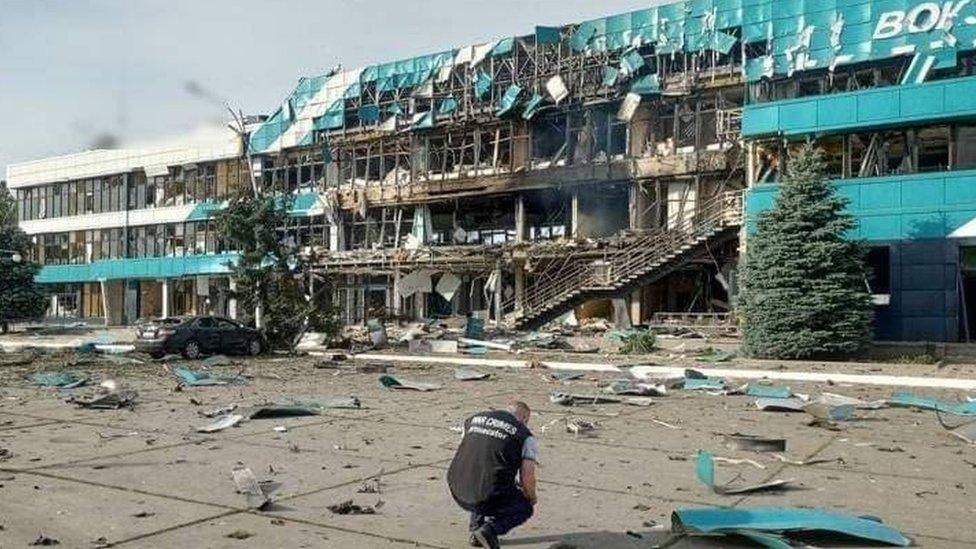
Ukrainian officials posted images of the damage to buildings at the port in Izmail
Russia's President Vladimir Putin has been accused by the West of "weaponising" food. But in a phone-call with Turkey's president on Wednesday, he stressed that he would not return to the UN deal until Russia's own exports of grain and fertiliser were guaranteed.
Moscow is frustrated with its own struggles to export and wants sanctions relaxed.
When it pulled out of the grain deal on 17 July, Russia threatened to target any vessels heading towards Ukraine's Black Sea ports, where the bulk of Ukraine's shipments had been moving - essentially imposing a naval blockade.
Now that Ukraine is unable to use its main Black Sea ports to export, the Danube is seen as the next best option. Moscow hopes the sight of burning warehouses and silos might make it look less appealing.
Even with the river route, it is feared Ukraine's grain exports will drop by a further half. It is also logistically more expensive.
The not-so-subtle message Russia is trying to convey by continually hitting Ukrainian ports is: you need us to export grain.
At the heart of these negotiations are Ukraine's wounded economy, as well as the millions of people who could be at risk of starvation if Ukrainian grain does not make it to them.
Ships have continued to sail across the Black Sea to Ukraine's ports on the Danube. Grain can also reach the Danube by road or rail via Moldova as well as Ukraine.
Once it gets to the Danube, much of the grain is transported by river to the Romanian Black Sea port of Constanta, from where it can be safely exported south.
Although Ukraine's seaports' register still listed Izmail as open on Wednesday, sources told Reuters news agency that operations there had been suspended.
Grain is also exported over land via Poland.
Ukraine has been looking into other possible routes with the help of European Union "solidarity lanes". This week, Ukrainian Foreign Minister Dmytro Kuleba said he had agreed with Croatia on the possibility of using its ports on the Danube and Adriatic Sea.
Moving Ukrainian grain across EU countries has become a difficult domestic issue for several states because of its impact on local markets. Poland and Romania are among EU members that have temporarily banned the sale of Ukrainian wheat and maize on domestic markets, while allowing transit elsewhere.
Wheat prices spiked on world markets immediately after the Russian withdrawal from the grain deal.
There are now also concerns about global food security, especially for impoverished African and Asian nations.
Overnight, Russia also launched more than 10 drones against Ukraine's capital, Kyiv, local officials say.
All the projectiles were destroyed by anti-aircraft systems, but several non-residential buildings were damaged by falling debris, the officials say.
Russia has so far not publicly commented on the reported attacks.

Related topics
- Published8 September 2023
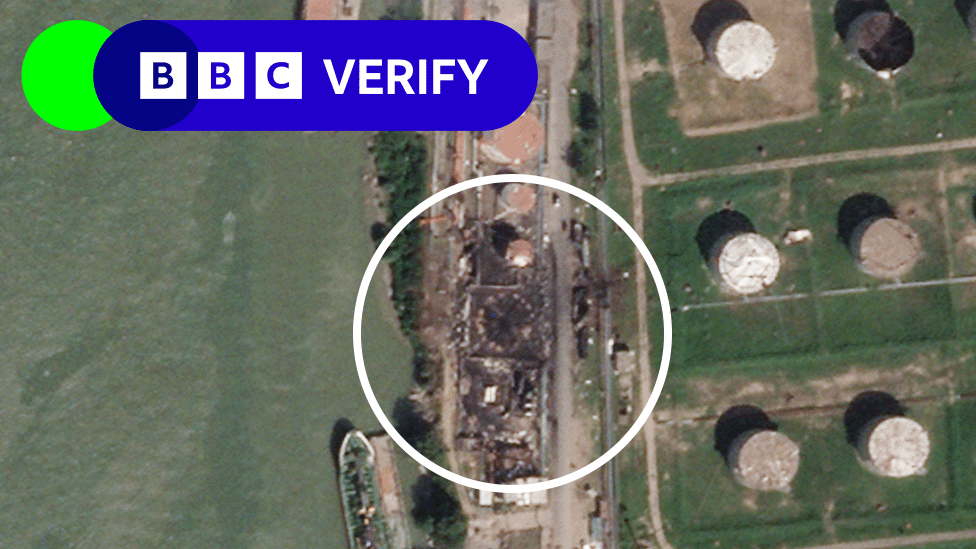
- Published24 July 2023
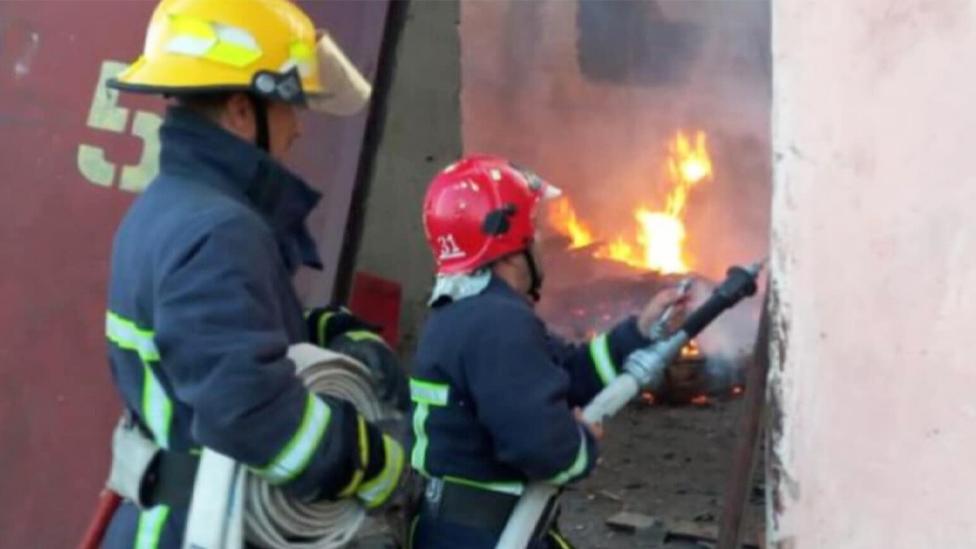
- Published24 July 2023

- Published2 April 2024
